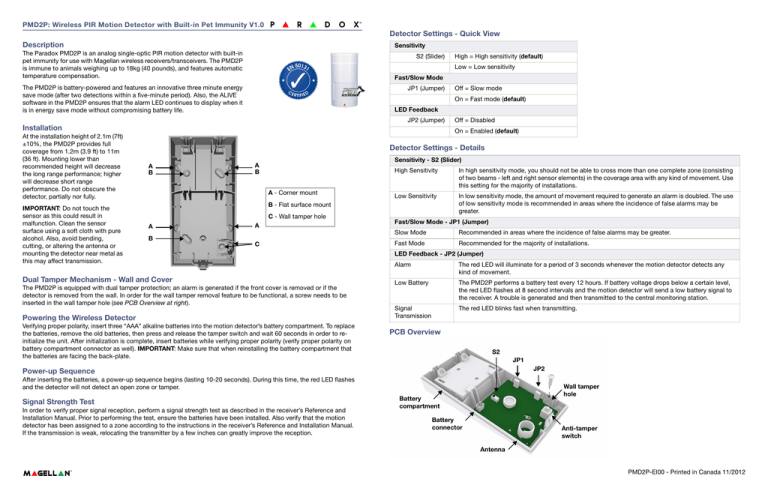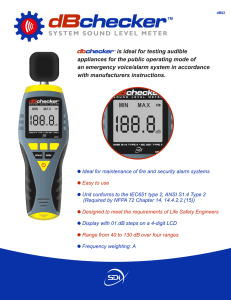
PMD2P: Wireless PIR Motion Detector with Built-in Pet Immunity V1.0
Detector Settings - Quick View
Description
Sensitivity
The Paradox PMD2P is an analog single-optic PIR motion detector with built-in
pet immunity for use with Magellan wireless receivers/transceivers. The PMD2P
is immune to animals weighing up to 18kg (40 pounds), and features automatic
temperature compensation.
S2 (Slider)
Low = Low sensitivity
Fast/Slow Mode
The PMD2P is battery-powered and features an innovative three minute energy
save mode (after two detections within a five-minute period). Also, the ALIVE
software in the PMD2P ensures that the alarm LED continues to display when it
is in energy save mode without compromising battery life.
JP1 (Jumper)
LED Feedback
Installation
IMPORTANT: Do not touch the
sensor as this could result in
malfunction. Clean the sensor
surface using a soft cloth with pure
alcohol. Also, avoid bending,
cutting, or altering the antenna or
mounting the detector near metal as
this may affect transmission.
Off = Slow mode
On = Fast mode (default)
JP2 (Jumper)
At the installation height of 2.1m (7ft)
±10%, the PMD2P provides full
coverage from 1.2m (3.9 ft) to 11m
(36 ft). Mounting lower than
recommended height will decrease
the long range performance; higher
will decrease short range
performance. Do not obscure the
detector, partially nor fully.
High = High sensitivity (default)
Off = Disabled
On = Enabled (default)
Detector Settings - Details
A
B
Sensitivity - S2 (Slider)
A
B
A - Corner mount
High Sensitivity
In high sensitivity mode, you should not be able to cross more than one complete zone (consisting
of two beams - left and right sensor elements) in the coverage area with any kind of movement. Use
this setting for the majority of installations.
Low Sensitivity
In low sensitivity mode, the amount of movement required to generate an alarm is doubled. The use
of low sensitivity mode is recommended in areas where the incidence of false alarms may be
greater.
B - Flat surface mount
C - Wall tamper hole
A
A
B
C
Dual Tamper Mechanism - Wall and Cover
The PMD2P is equipped with dual tamper protection; an alarm is generated if the front cover is removed or if the
detector is removed from the wall. In order for the wall tamper removal feature to be functional, a screw needs to be
inserted in the wall tamper hole (see PCB Overview at right).
Powering the Wireless Detector
Verifying proper polarity, insert three “AAA” alkaline batteries into the motion detector’s battery compartment. To replace
the batteries, remove the old batteries, then press and release the tamper switch and wait 60 seconds in order to reinitialize the unit. After initialization is complete, insert batteries while verifying proper polarity (verify proper polarity on
battery compartment connector as well). IMPORTANT: Make sure that when reinstalling the battery compartment that
the batteries are facing the back-plate.
Fast/Slow Mode - JP1 (Jumper)
Slow Mode
Recommended in areas where the incidence of false alarms may be greater.
Fast Mode
Recommended for the majority of installations.
LED Feedback - JP2 (Jumper)
Alarm
The red LED will illuminate for a period of 3 seconds whenever the motion detector detects any
kind of movement.
Low Battery
The PMD2P performs a battery test every 12 hours. If battery voltage drops below a certain level,
the red LED flashes at 8 second intervals and the motion detector will send a low battery signal to
the receiver. A trouble is generated and then transmitted to the central monitoring station.
Signal
Transmission
The red LED blinks fast when transmitting.
PCB Overview
S2
JP1
JP2
Power-up Sequence
After inserting the batteries, a power-up sequence begins (lasting 10-20 seconds). During this time, the red LED flashes
and the detector will not detect an open zone or tamper.
Signal Strength Test
In order to verify proper signal reception, perform a signal strength test as described in the receiver’s Reference and
Installation Manual. Prior to performing the test, ensure the batteries have been installed. Also verify that the motion
detector has been assigned to a zone according to the instructions in the receiver’s Reference and Installation Manual.
If the transmission is weak, relocating the transmitter by a few inches can greatly improve the reception.
Wall tamper
hole
Battery
compartment
Battery
connector
Anti-tamper
switch
Antenna
PMD2P-EI00 - Printed in Canada 11/2012
Specifications
Alive Software
To conserve the motion detector’s battery life, if the motion detector transmits two open zone signals (LED on for 3s)
within a five-minute period, the detector will fall into Energy Save Mode for approximately three minutes and will not
transmit any alarm signals. The red LED will continue to flash to indicate a detection. If the detector’s cover is removed
and then replaced while in Energy Save Mode, the first detection will trigger an alarm signal.
Sensor Type
Dual rectangular element
Coverage
88.5° - 11m (36ft) x 11m (36ft); Center beams: 15m (49ft)
Pet Immunity
18kg (40lbs)
Walk-testing
RF Frequency
433 or 868 MHz with Magellan only
Lens
2nd generation Fresnel lens, LODIFF® segments
Walk Speed
0.2m to 3.5m/s (0.6ft to 11.5ft/s)
Battery Type & Life
3 x 1.5vDC “AAA” alkaline batteries; 2 years*
Current Rating
31uA standby / 15mA alarm
Transmitter Range
35m (115ft) typical in a residential environment
Operating Temp. &
Humidity
0°C to 50°C (32°F to 122°F) / 5 to 90% max.
Dimensions & Weight
6.5 x 12.5 x 5.2cm (2.5 x 4.9 x 2.0 in) / 105 g (3.7 oz) with batteries
RF Immunity
EN 50130-4: 10V/m 80MHz to 2.7GHz
Compatibility
See paradox.com for compatibility details
Certification
EN 50131 Grade 2 Class II; Certification body Intertek
To activate Walk-test Mode for three minutes, power up the detector or open and close the detector’s cover. With
sensitivity set to High (S2 = High), at 20°C, crossing more than one complete zone (consisting of two beams left and
right sensor detecting elements) with slow/fast walking or running should initiate an alarm. With sensitivity set to Low
(S2= Low), the amount of movement required to generate an alarm is doubled.
Beam Pattern
88.5°
* Battery life expectancy will vary according to the amount of traffic (movement) detected. Higher traffic levels will lower battery life.
16m
14m
8m
6m
10m
4m
12m
(52.5ft) (45.9ft) (39.4ft) (32.8ft) (26.3ft) (19.7ft) (13.1ft)
2m
(6.6ft)
0
2m
6m
8m
4m
10m
12m
14m
16m
(6.6ft) (13.1ft) (19.7ft) (26.3ft) (32.8ft) (39.4ft) (45.9ft) (52.5ft)
2.1m
(6.8ft)
0
12m
2m
8m
10m
14m
16m
4m
6m
(6.6ft) (13.1ft) (19.7ft) (26.3ft) (32.8ft) (39.4ft) (45.9ft) (52.5ft)
Warranty: For complete warranty information on this product, please refer to the Limited Warranty Statement found on the Web site www.paradox.com/terms. Your use of the Paradox
product signifies your acceptance of all warranty terms and conditions.
© 2012 Paradox Ltd. All rights reserved. Specifications may change without prior notice.
Patents: One or more of the following US patents may apply: 7046142, 6215399, 6111256, 6104319, 5920259, 5886632, 5721542, 5287111, and RE39406 and other pending patents
may apply. Canadian and international patents may also apply.
PMD2P-EI00 - Printed in Canada 11/2012



